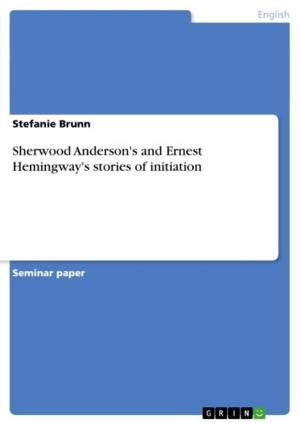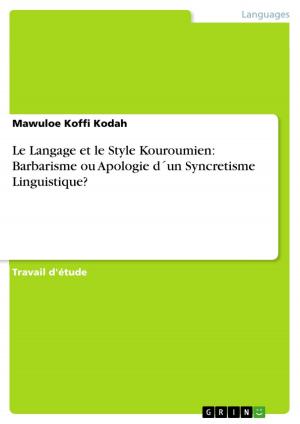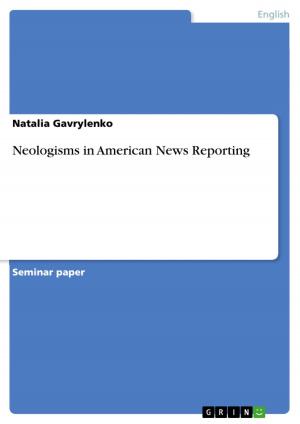'Madonna On the Couch'
A psychoanalytic view on Madonna's music videos
Nonfiction, Entertainment, Drama, Anthologies| Author: | Matthias Groß | ISBN: | 9783640104598 |
| Publisher: | GRIN Publishing | Publication: | July 16, 2008 |
| Imprint: | GRIN Publishing | Language: | English |
| Author: | Matthias Groß |
| ISBN: | 9783640104598 |
| Publisher: | GRIN Publishing |
| Publication: | July 16, 2008 |
| Imprint: | GRIN Publishing |
| Language: | English |
Seminar paper from the year 2007 in the subject American Studies - Literature, grade: 1,0, University of Leipzig (Institut für Amerikanistik), course: Psychoanalysis in Literature, 19 entries in the bibliography, language: English, abstract: This paper is taking interest in Madonna and psychoanalysis, yet it is not supposed to conclude as an analysis of Madonna and her psychic condition as a patient. However, what I am trying to do on the following pages is to detect and employ various concepts of Freud's revolutionary theory (or rather theories) in the context of pop star Madonna and her music videos in particular. Initiated by a seminar on psychoanalysis and literature, this paper tries to portray how influential Freud's findings were and to this day still are, but probably also that the post-Freudian society at times seems to escape into thoroughly explaining matters with the help of their layman understandings and ideas of psychoanalysis. What I am trying to say is that one is tempted to overdo interpretations with the help of psychoanalysis, ignoring the fact that it has limitations as well. I noticed myself, especially, becoming oblivious to that fact when analyzing Madonna. That occurrence, however, exemplifies how prone we are, as post-Freudians, to employ this theory in our thinking, understanding, and interpretation of ideas and concepts; not only in academic spheres, but also in everyday life. I have tried to structure this paper in accordance of the various psychoanalytic concepts that I chose to discuss in regard to Madonna's music videos. However, my intended agenda for this essay proved somewhat incompatible with my findings, which means that quite frequently there was no clear-cut distinction to make between, for instance, the universal prominence of sexuality and the dream and their overall importance in applying psychoanalytic theory on literary texts (in this case on music videos and sequences). Owing to better readability and coherence, however, I still arranged this paper in chapters, pointing out once more that cross-references and repetitions to some extent are indispensable. Since the focus of this paper is on Madonna's music videos, visual representations so to speak, I start out discussing the importance of psychoanalysis and its ramifications for film theory. I have struggled with the equalization of entire films, in which film theory is based, and music videos; yet I have found that these sequences, in a way, tell entire stories as well, and, owing to their limitations in regard to the time frame, are condensed to a much larger extent than are ordinary films, which is reflected in the frequent employment of symbolism and ciphers in music-video composition (This condensation itself implies a close similarity to Freud's comments about the dream-work.) Beginning with general theoretical observations on film theory and psychoanalysis in terms of modes and conventions of perception I will lead to the discussion of the actual contents of Madonna's music videos in regard to at least some of Freud's ideas.
Seminar paper from the year 2007 in the subject American Studies - Literature, grade: 1,0, University of Leipzig (Institut für Amerikanistik), course: Psychoanalysis in Literature, 19 entries in the bibliography, language: English, abstract: This paper is taking interest in Madonna and psychoanalysis, yet it is not supposed to conclude as an analysis of Madonna and her psychic condition as a patient. However, what I am trying to do on the following pages is to detect and employ various concepts of Freud's revolutionary theory (or rather theories) in the context of pop star Madonna and her music videos in particular. Initiated by a seminar on psychoanalysis and literature, this paper tries to portray how influential Freud's findings were and to this day still are, but probably also that the post-Freudian society at times seems to escape into thoroughly explaining matters with the help of their layman understandings and ideas of psychoanalysis. What I am trying to say is that one is tempted to overdo interpretations with the help of psychoanalysis, ignoring the fact that it has limitations as well. I noticed myself, especially, becoming oblivious to that fact when analyzing Madonna. That occurrence, however, exemplifies how prone we are, as post-Freudians, to employ this theory in our thinking, understanding, and interpretation of ideas and concepts; not only in academic spheres, but also in everyday life. I have tried to structure this paper in accordance of the various psychoanalytic concepts that I chose to discuss in regard to Madonna's music videos. However, my intended agenda for this essay proved somewhat incompatible with my findings, which means that quite frequently there was no clear-cut distinction to make between, for instance, the universal prominence of sexuality and the dream and their overall importance in applying psychoanalytic theory on literary texts (in this case on music videos and sequences). Owing to better readability and coherence, however, I still arranged this paper in chapters, pointing out once more that cross-references and repetitions to some extent are indispensable. Since the focus of this paper is on Madonna's music videos, visual representations so to speak, I start out discussing the importance of psychoanalysis and its ramifications for film theory. I have struggled with the equalization of entire films, in which film theory is based, and music videos; yet I have found that these sequences, in a way, tell entire stories as well, and, owing to their limitations in regard to the time frame, are condensed to a much larger extent than are ordinary films, which is reflected in the frequent employment of symbolism and ciphers in music-video composition (This condensation itself implies a close similarity to Freud's comments about the dream-work.) Beginning with general theoretical observations on film theory and psychoanalysis in terms of modes and conventions of perception I will lead to the discussion of the actual contents of Madonna's music videos in regard to at least some of Freud's ideas.















